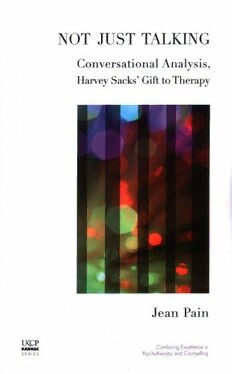
Not Just Talking (United Kingdom Council for Psychotherapy Series) PDF
213 Pages·2009·0.734 MB·English
Most books are stored in the elastic cloud where traffic is expensive. For this reason, we have a limit on daily download.
Preview Not Just Talking (United Kingdom Council for Psychotherapy Series)
Description:
Good relationships depend, above all, on our skills in conversation. Harvey Sacks' method, Conversational Analysis, was the springboard for Jean Pain's research into psychotherapy as a social activity that depends for its success on the quality of the therapeutic dialogue. She wrote this book not only for therapists, but for all those who do not understand what psychotherapy is for and are curious to know how it works. Jean Pain offers us new tools for all kinds of conversation to work for, rather than against, us. Read more... Content: COVER; CONTENTS; ACKNOWLEDGEMENTS; PREFACE; INTRODUCTION; PART I The Principles of Speech and Human Social Behaviour; CHAPTER ONE The silent revolution; CHAPTER TWO The purpose of conversation and its link with psychotherapy; CHAPTER THREE Economy-The key to the practice of conversation; CHAPTER FOUR The therapeutic relationship; PART II The Therapeutic Dialogue in Practice; CHAPTER FIVE Getting clients to talk; CHAPTER SIX Troubles-telling; CHAPTER SEVEN The identification of the client'sproblem; CHAPTER EIGHT Conclusions; APPENDIX 1 Glossary; APPENDIX 2 Transcription key Abstract: Good relationships depend, above all, on our skills in conversation. Harvey Sacks' method, Conversational Analysis, was the springboard for Jean Pain's research into psychotherapy as a social activity that depends for its success on the quality of the therapeutic dialogue. She wrote this book not only for therapists, but for all those who do not understand what psychotherapy is for and are curious to know how it works. Jean Pain offers us new tools for all kinds of conversation to work for, rather than against, us
See more
The list of books you might like
Most books are stored in the elastic cloud where traffic is expensive. For this reason, we have a limit on daily download.
